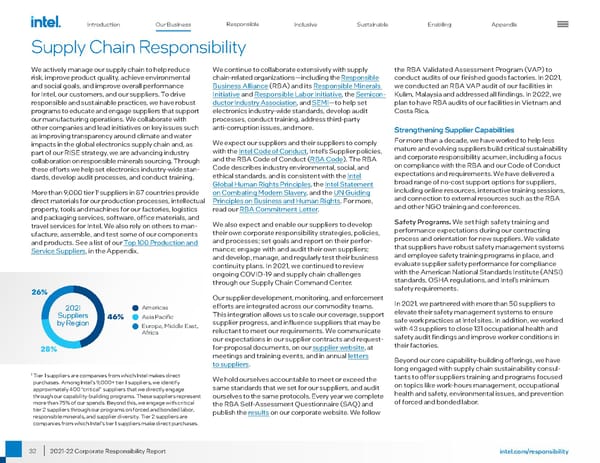32 intel.com/responsibility 2021-22 Corporate Responsibility Report Supply Chain Responsibility We actively manage our supply chain to help reduce risk, improve product quality, achieve environmental and social goals, and improve overall performance for Intel, our customers, and our suppliers. To drive responsible and sustainable practices, we have robust programs to educate and engage suppliers that support our manufacturing operations. We collaborate with other companies and lead initiatives on key issues such as improving transparency around climate and water impacts in the global electronics supply chain and, as part of our RISE strategy, we are advancing industry collaboration on responsible minerals sourcing. Through these efforts we help set electronics industry-wide stan - dards, develop audit processes, and conduct training. More than 9,000 tier 1 1 suppliers in 87 countries provide direct materials for our production processes, intellectual property, tools and machines for our factories, logistics and packaging services, software, office materials, and travel services for Intel. We also rely on others to man - ufacture, assemble, and test some of our components and products. See a list of our Top 100 Production and Service Suppliers , in the Appendix. We continue to collaborate extensively with supply chain-related organizations—including the Responsible Business Alliance (RBA) and its Responsible Minerals Initiative and Responsible Labor Initiative , the Semicon - ductor Industry Association , and SEMI —to help set electronics industry-wide standards, develop audit processes, conduct training, address third-party anti-corruption issues, and more. We expect our suppliers and their suppliers to comply with the Intel Code of Conduct , Intel’s Supplier policies, and the RBA Code of Conduct ( RBA Code ). The RBA Code describes industry environmental, social, and ethical standards, and is consistent with the Intel Global Human Rights Principles , the Intel Statement on Combating Modern Slavery , and the UN Guiding Principles on Business and Human Rights . For more, read our RBA Commitment Letter . We also expect and enable our suppliers to develop their own corporate responsibility strategies, policies, and processes; set goals and report on their perfor - mance; engage with and audit their own suppliers; and develop, manage, and regularly test their business continuity plans. In 2021, we continued to review ongoing COVID-19 and supply chain challenges through our Supply Chain Command Center. Our supplier development, monitoring, and enforcement efforts are integrated across our commodity teams. This integration allows us to scale our coverage, support supplier progress, and influence suppliers that may be reluctant to meet our requirements. We communicate our expectations in our supplier contracts and request- for-proposal documents, on our supplier website , at meetings and training events, and in annual letters to suppliers . We hold ourselves accountable to meet or exceed the same standards that we set for our suppliers, and audit ourselves to the same protocols. Every year we complete the RBA Self-Assessment Questionnaire (SAQ) and publish the results on our corporate website. We follow the RBA Validated Assessment Program (VAP) to conduct audits of our finished goods factories. In 2021, we conducted an RBA VAP audit of our facilities in Kulim, Malaysia and addressed all findings. In 2022, we plan to have RBA audits of our facilities in Vietnam and Costa Rica. Strengthening Supplier Capabilities For more than a decade, we have worked to help less mature and evolving suppliers build critical sustainability and corporate responsibility acumen, including a focus on compliance with the RBA and our Code of Conduct expectations and requirements. We have delivered a broad range of no-cost support options for suppliers, including online resources, interactive training sessions, and connection to external resources such as the RBA and other NGO training and conferences. Safety Programs. We set high safety training and performance expectations during our contracting process and orientation for new suppliers. We validate that suppliers have robust safety management systems and employee safety training programs in place, and evaluate supplier safety performance for compliance with the American National Standards Institute (ANSI) standards, OSHA regulations, and Intel’s minimum safety requirements. In 2021, we partnered with more than 50 suppliers to elevate their safety management systems to ensure safe work practices at Intel sites. In addition, we worked with 43 suppliers to close 131 occupational health and safety audit findings and improve worker conditions in their factories. Beyond our core capability-building offerings, we have long engaged with supply chain sustainability consul - tants to offer suppliers training and programs focused on topics like work-hours management, occupational health and safety, environmental issues, and prevention of forced and bonded labor. 1 Tier 1 suppliers are companies from which Intel makes direct purchases. Among Intel’s 9,000+ tier 1 suppliers, we identify approximately 400 “critical” suppliers that we directly engage through our capability-building programs. These suppliers represent more than 75% of our spends. Beyond this, we engage with critical tier 2 suppliers through our programs on forced and bonded labor, responsible minerals, and supplier diversity. Tier 2 suppliers are companies from which Intel’s tier 1 suppliers make direct purchases. Europe, Middle East, Africa Americas Asia Pacific 46% 28% 26% 2021 Suppliers by Region Introduction Responsible Inclusive Sustainable Enabling Appendix Our Business
 Intel Corporate Responsibility Report Page 31 Page 33
Intel Corporate Responsibility Report Page 31 Page 33